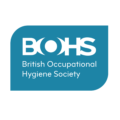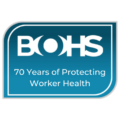BOHS asks for immediate action to stop unnecessary silica deaths
The British Occupational Hygiene Society (BOHS), a leading scientific charity and the Chartered Society for Worker Health Protection, is highlighting the need for real and immediate action to end illnesses and deaths from cancer-causing silica dust. In its response to the All-Party Parliamentary Group on Respiratory Health inquiry on the risks of Occupational Exposure to Respirable Crystalline Silica (RCS), it calls for better controls in the prevention of silicosis, an often-fatal lung condition which continues to undermine the respiratory health of hundreds of UK workers exposed to silica dust risks at their workplace.
Despite the risks of silica dust being known for thousands of years, the impact of high exposure being irreversible and prevention being easy, the Society says not nearly enough is being done about it. It is believed that 500 UK construction workers die each year from silicosis and silica is linked to the estimated 4,000 deaths a year from COPD. However, it is believed 75,000 cases could easily be prevented, if action was taken.
In its detailed response, the Society emphasizes the importance of prevention as the most sustainable way to protect workers’ health and save millions of pounds spent every year for treatments and sickness benefits. BOHS makes a systematic review of the opportunities to manage risks arising from RCS and focuses on the opportunities to control and prevent risk in the workplace. It also focuses on recent developments on silica dust risk reduction, including managing and designing out risks and monitoring exposure levels.
The Society believes that silica- dubbed “the next Asbestos”- is an exposure which can benefit from a national strategy, focused regulatory, educational and information support and is crucial to equalising health opportunities and reducing the burden on health and social care.
BOHS Chief Executive Officer, Professor Kevin Bampton, said: “The report highlights how the government can save lives quite literally with a stroke of the pen. At a time where we are wondering about health and social care costs and a labour shortage, it seems obvious that stopping people getting disabled and ill at work can save money and save lives.
“I am told that the latest HSE information from their construction dust campaign is reportedly showing that things are getting worse rather than better, with 4 out of 10 construction workers being exposed to cancer-causing levels of silica.”
The Society has also contributed with supplementary evidence to the recent one-year update inquiry, recommending the development of an integrated prevention and care strategy of awareness, communication and collaboration within healthcare provision to enable clinical diagnosis to inform and drive prevention in the workplace.
You can read BOHS’s full response here.





